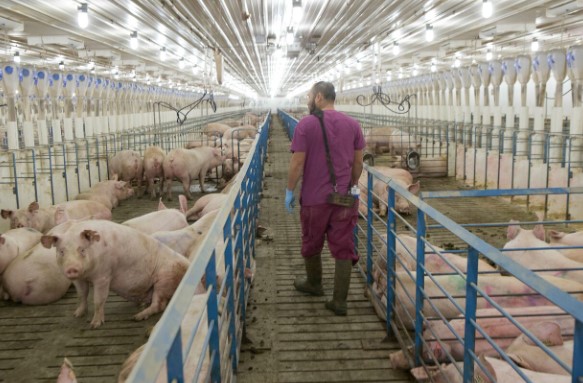
Senior Farm and Ranch Broadcaster, Ron Hays got the chance to visit with the Chief Executive Officer of the National Pork Producers Council, Bryan Humphreys, talking about Proposition 12 in California and other pressing issues in the pork industry.
Humphreys said California Proposition 12, which prohibits sales of meat and egg products from animals confined in a noncomplying manner, has been a challenge for the pork industry. It is critical, Humphreys said, to help the public understand the challenges that Proposition 12 presents for the industry and the criteria needed to provide a legal and compliant product in the state of California.
“Several years ago, NPPC with our good friends and partners over at the Farm Bureau Federation filed suit, and very fortunately earlier this spring, the U.S. Supreme Court agreed to hear this case,” Humphreys said. “We filed our briefs, and we were fortunate that in mid-June the United States Solicitor General even joined on in support of our case and our arguments against Prop 12. Oral arguments are coming up this fall and we are looking for a hopefully favorable ruling sometime a few months after that. But this is a real challenge for the industry, and I am glad that NPPC could stand up and fight for the American producer with our good friends at the American Farm Bureau.”
One of the biggest key points that needs to be made for the pork industry, Humphreys said, is the Dormant Commerce Clause regarding the way it is written.
“The way the draft rules have come out is in overreach across state lines and that presents a real challenge to the sovereignty of the folks right here in Oklahoma to be able to raise their pigs and to be able to do what they believe is best for the animal and animal welfare,” Humphreys said. “So, to have folks from California coming into the state of Oklahoma to tell them how to raise pigs presents real challenges for not only the folks here in Oklahoma but around the country.”
Humphreys said the superior court in the state of California has put a stay on the Dormant Commerce Clause, so it cannot be implemented until final rules are submitted.
“It has allowed some breathing room for our industry to wait to hear what the Supreme Court is going to rule, hopefully, and then be able to determine our future as an industry there and how we are going to comply,” Humphreys said. “As far as are we getting through to the folks there, I sure hope they recognize the challenges this puts on an industry that is just trying to provide a high-quality and affordable product to the American consumer.”
The Dormant Commerce Clause, Humphreys said, presents real challenges for the pork industry in having the ability to operate while caring for their animals and employees.
Humphreys also talked about challenges in Massachusetts with Question 3, which also relates to the confinement of farm animals.
“Massachusetts Questions 3 actually passed prior to Proposition 12 and is actually supposed to be implemented on August 15th and that presents some similar challenges in animal housing and being able to supply product to the state of Massachusetts,” Humphreys said.
Question 3 presents many challenges for pork producers concerning how producers will raise animals efficiently and provide for consumers while complying with the law.
“We are continuing to work through that and continue to have conversations and trying to get all that figured out on behalf of the American pork producer,” Humphreys said. “But again, another real challenge there in the state of Massachusetts as our industry is just trying to provide a high-quality affordable bacon to the American consumer.”
The American consumer, Humphreys said, is interested in how their food is raised just as the American farmer cares about raising that food the right way.
“It is our job as folks in agriculture to help tell that story and create that level of comfort,” Humphreys said. “I grew up on a farm, my son is working on the farm today and we care for our animals, we care for our communities, we care for the environment that we are in and folks should be proud of that.
It is important that people who work in agriculture make sure we are telling that story and being proud of who we are and what we do on our farms, Humphreys said, which will help give that level of confidence to the American consumer that we are doing the right things every day.
Humphreys also touched on the threat of African Swine Fever on the pork industry.
“It is our job as an industry and representatives of that industry to do everything we can to help position us to be as prepared as possible but also work on the prevention methods,” Humphreys said.
The NPPC’s work with the USDA through APHIS and customs and borders ensures that the United States is doing everything possible to prevent the disease from coming into the country.
“That goes back to our work with congressman and senators to ensure that there is adequate funding within the Farm Bill to ensure that we have what we need as an industry in the Federal Government to protect our industry from this horrific disease that is just off the coast in the Dominican Republic,” Humphreys said.
Disease prevention, Humphreys said, goes back to the Farm Bill.
“We really need to be focused on increased funding for research and for education as it relates to ensuring that we are at the forefront of technology challenges against the technology that we can have in our industry and all of agriculture to be better at what we do every day,” Humphreys said.
Click the LISTEN BAR below to hear more from Ron Hays and Bryan Humphreys on NPPC’s role in facing the latest issues in the pork industry.


















